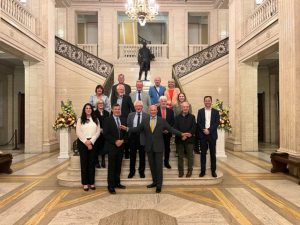
In July, a GPII team visited Belfast and Dublin, where they were joined by partners from Belfast-based Rethinking Conflict, Cambridge University’s Kings College, and the University of Manchester. The delegation was hosted by Rev. Dr. Gary Mason, who is a noted global expert in conflict resolution and transformation. This was the second such GPII visit to Belfast and was more targeted towards implementing a plan to build a conflict transformation center which will feature academic, informational, research, and outreach components. The American University in Cairo’s School of Global Affairs and Public Policy is also supporting the project.
Why launch a conflict transformation program, which will lean heavily on the success of the Good Friday Agreement? Because this agreement, which ended at long last the Northern Ireland’s Troubles, is a rare example of successfully ending what was once thought of as an intractable problem which centered, at its core, on land, identity, and religion. Many recent conflicts have similar origins. The Good Friday process also highlights what is needed to create an atmosphere in which a peace agreement can succeed.
First, there needs to be work undertaken at all levels of society to reach agreement that violence and further warfare will not resolve the underlying problems – all parties must commit to a future in which the ballot box, or at least politics, is the tool used to resolve disputes rather than the gun. In Northern Ireland, the parties were all exhausted after 30 years and 50,000 casualties – Republican, Loyalists, and British armed forces and police were ready to move on.
Second, the parties must agree to disagree. As one can quickly detect by talking to former militants and political leaders from either the Republican and Loyalist side, people tend to stick to their narratives about identity, facts, and their own victimization. This does not mean they lack empathy for others, but they see the world as it has been explained to them. But what all see is that a future without violence is preferable to continual armed conflict.
When Jimmy Carter brokered the Camp David Accords, there was a moment when negotiations in rural Maryland looked like they had failed. President Carter invited Israeli Prime Minister Begin into his cabin for one final talk. Carter began signing a picture to the Begin’s grandchildren, personalizing each autograph. Begin, considered a hard liner, suddenly began to weep thinking of their future. And with that, peace negotiations resumed and were ultimately successful. Sadat of course ultimately paid with his life for his courageous support of peace, but Egypt and Israel have not been to war since – even if relations are cool.
Third, as Rethinking Conflict’s Emerging Young Leaders program demonstrates, while those who grew up in conflict are inevitably scarred by it, future generations offer hope that the narrative can change. Talking to young leaders from Mason’s first and second cohorts, all of whom are in their 30’s, they see a much different world than that of their parents, and even older siblings. The UCF conflict transformation initiative will include a young leaders program – involving UCF and other students.
Another important lesson which can be gleaned is the proper use of American power and influence. Former President Bill Clinton was dedicated to peace in Northern Ireland, and dispatched former Senate Majority Leader George Mitchell to help negotiate the Good Friday Agreement. President George W. Bush, who succeeded Clinton, also supported the process – making it a non-partisan issue. The United States helped draw investment to the war-torn area and offered some financial support. But mostly the U.S. utilized soft power to cinch a deal. This is in stark contrast to some conflicts underway today.
Washington worked closely with the United Kingdom and Republic of Ireland to make the deal work. This is a great example of how allies can work together and support a common objective, even if on occasion they disagree on tactics. Solving global problems takes a global village.
No two conflicts are alike, so it would be a mistake to conclude the Northern Ireland model offers a blueprint for resolving all conflicts. But it is an example of what a successful process looks like. And the key word is process. It takes time. Everyone loses a little, but wins a great deal by committing and recommitting to the process – even when rejectionists and bitter enders – and they exist in every conflict – try to exercise a veto power by carrying out a terrorist attack or other action which risks peace.
The Center for Conflict Transformation and Peace, when it comes online, will serve as a dynamic agent in creating conditions for peace and understanding the nature of conflict and conflict resolution. Academically, we will offer curriculum, classes, scholar exchanges, and a young leaders program. We will organize events, speaker series, seminars, and policymaker briefings. We will facilitate research, publications, and broadcasts dedicated to conflict transformation. And we will utilize our broad network of like-minded organizations and individuals to get the word out about this important initiative, and the need to focus on resolving rather than escalating conflict.
UCF offers the United States a model of how to build a world-class university in just a few short decades. GPII hopes the conflict transformation initiative, with the support of our faculty and partners, can create a unique center that offers successful alternative solutions to conflict resolution rather than endless military action and smoldering hatreds that continually threaten to morph into war.